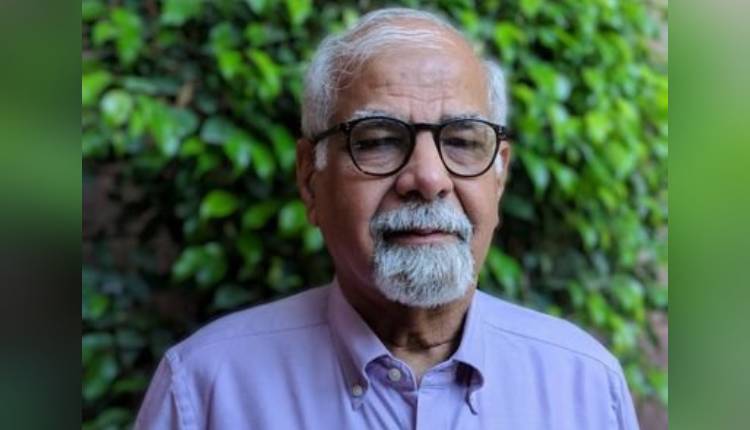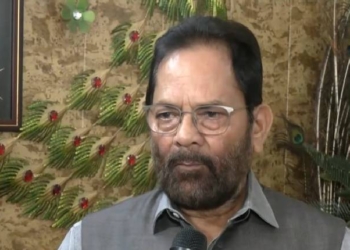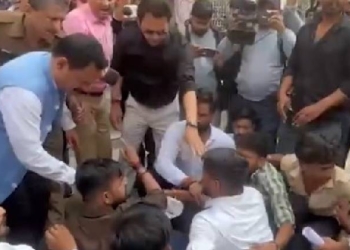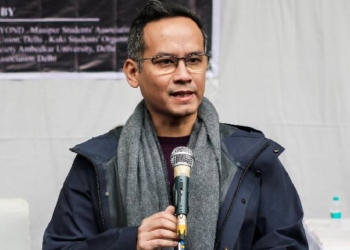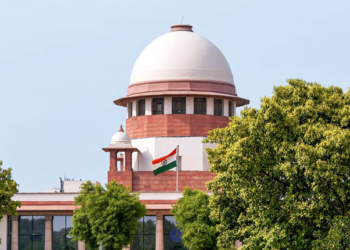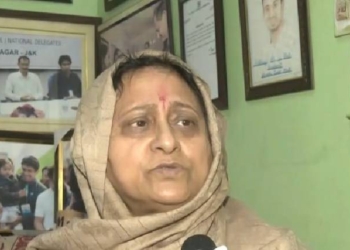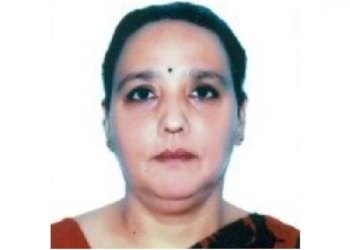New Delhi: Surjit Bhalla, a well-known economist, author and columnist, in an exclusive interview with IANS, shared his views on a spectrum of issues ranging from economic, social and political issues besides also forecasting a whopping 325-350 seats for the Bharatiya Janata Party (BJP) alone, in the ongoing Lok Sabha elections.
Surjit Bhalla has served as India’s Executive Director at the International Monetary Fund (IMF) and was also a member of the Economic Advisory Council, during the second term of Prime Minister Narendra Modi-led government.
Below is economist Surjit Bhalla’s exclusive interview with IANS.
IANS: Lok Sabha elections are underway. So far, two phases of polling have been completed. Recently, you predicted that the BJP could win 325 to 350 seats. On what basis, you estimated the numbers?
Surjit Bhalla: As you know, when the first phase of elections took place, there was much discussion about its impact because the voter turnout was low. This led to speculation whether the reduced voter turnout would harm the BJP or the Congress and INDIA bloc.
On the basis of studies and research I undertook on these issues, we will get to know how the BJP performed in each Lok Sabha constituency compared to the previous elections and how it performed in this election, after the elections are over. Then, we can correlate it with the voter turnout.
However, there are several Parliamentary constituencies where two percentage points in the aggregate have increased, while there are many others where it hasn’t seen any significant rise.
Though, much cannot be drawn from seven phases at this hour, my direct answer is that around 330 to 350 seats will go to the BJP.
IANS: What do you think is the reason for this? Is it due to the schemes of Modi government or BJP’s strong election machinery or are you anticipating ‘Modi wave’ in 2024, akin to what was in 2014?
Surjit Bhalla: The most important question is why people vote for any party or leader. We have had elections in our country for the past 50-60 years. From 1952 to 1962, Jawaharlal Nehru was the Prime Minister. He won all three elections, and at that time, our economy was poor. There wasn’t much choice among people for voting. After that, the most crucial determinant of voting was what changes occurred in your life.
The government’s policies, whether of the BJP or Congress, affect the lives of every individual. If you vote is based on this, you see what changes have come in people’s lives from 2019 to 2024.
You will see that the policies brought by Modi government, whether related to food, housing, or water supply, directly impacted people’s lives.
Though everyone earns their livelihood, the social services by this government is standing out as one of its hallmarks.
In India, the government is involved in social services. You should remember that in 1985, the then Prime Minister Rajiv Gandhi had said that if the government spends Rs 1, only 15 paise reaches the poor. The rest goes to corruption and middlemen. The need of that hour was to devise a policy to plug that loophole and devise a mechanism to stop that pilferage.
As per my own research, even 15 paise is over-estimated. An amount lesser than 15 paise reached the poor.
Global bodies like the World Bank and IMF admit today that the delivery is 90 per cent now. The money that government spends on the poor, goes directly to them.
Moreover, the Food Security Act came in 2013. At that time, 20-25 per cent of the poor benefited from it but now more than 90 per cent are benefitting from it.
Modi government has done commendable work in bringing hygiene and sanitation. Nothing happened on this front until 2014 for 60 years.
There were no toilets in villages for the poor.
PM Modi has worked on women’s safety. Even the toilets, in terms of safety and health, are a significant initiative.
The ‘Beti Bachao, Beti Padhao’ campaign is also one of key policy. Based on all the government’s schemes, it can be said that the BJP can win 330 or 350 seats in the elections, on its own.
IANS: The INDIA bloc, which is in the election arena against the BJP, says that inflation and unemployment are two biggest problems in the country. What is your opinion on this?
Surjit Bhalla: When was there no inflation? Does the Opposition or government go to the voter and asks them what the inflation rate is. Inflation keeps fluctuation, either upwards or downwards. There hasn’t been a year when there hasn’t been no inflation.
Elections have been going on for so many years, and I have examined that the inflation rate is empirical. It’s a matter of data. It stays in the voter’s mind what the situation of their income and employment was in 2019 and what it is now.
Young people discuss unemployment. The unemployment rate was 16 per cent in 2019, now it is 10 per cent. It’s not that unemployment has become zero or inflation has become zero, but whatever changes have happened, people feel good about them and they are happy.
So, the voter who votes sees whether something good has happened in their life during this time, and according to these figures, something has indeed happened.
IANS: What is your opinion of Rahul Gandhi, as a mass leader?
Surjit Bhalla: Leadership is a big deal. There is no evidence on whether Rahul Gandhi is an influential leader or not. In 2013, he tore apart his government’s ordinance in front of everyone. Leaders don’t do that.
At that time, it was Manmohan Singh’s government. He went against his own government then. Nowadays, the elections are fought based on face. At this time, who is the face of the Opposition? I don’t see anyone.
There are 50 faces in the Opposition INDIA bloc whereas the BJP has one face i.e. PM Modi.
This is another reason for BJP’s good show in these elections.
IANS: Do you think Rahul Gandhi has caused the most damage to Congress?
Surjit Bhalla: In today’s world, people have become aware of their rights, and nobody likes dynasty politics. After the elections, there should be a discussion within the Congress on whether they should field dynasts in the elections.
According to me, that era is gone. The dynasty has been ruling for 70 years. But now, the elections will be based on merit.
IANS: Do you think Rahul Gandhi has a chance to become Prime Minister, considering the fact that Congress has ruled the country for 60 years including Nehru, Indira and Rajiv?
Surjit Bhalla: No… there are two leaders of Congress whose names you didn’t mention. P.V. Narasimha Rao and Manmohan Singh. Now people have realised, that if you see these two leaders of Congress, no party member talks about them.
People feel that Congress shies away from taking their names despite both doing a wonderful job in their tenures.
Congress doesn’t take their name, this is not true leadership.
IANS: Is Congress a Muslim-oriented party?
Surjit Bhalla: I’ll answer this by saying, Congress today bats for a caste-based census and reservations in proportion to the population. This is quite an outdated idea, which does have any appeal now. The strength of India lies in its diversity. If you tell everyone to go by quota, as Congress leaders is proposing now, what will be gained from it? I think their campaign is not in right direction.
The book ‘How We Vote’ reveals another aspect. It shows that there are two parties that benefit from alliances and two parties that suffer losses from alliances.
Parties like Congress and Aam Aadmi Party (AAP) benefit from the alliance whereas JD-U and Trinamool Congress are parties that suffer losses from alliances.
IANS: Are people associated with INDIA bloc and Congress attempting Muslim appeasement? Will they benefit from it in elections?
Surjit Bhalla: The appeasement you are talking about, especially Muslim appeasement, started with Khomeini era, when fundamentalists became active in Iran.
In 1984, Rajiv Gandhi government came and shocked everyone with stand on Shah Bano case. Then, Salman Rushdie’s book was banned. The stand on Ram Temple issue shows another duplicity of the grand old party. Ram Mandir is among the most revered shrines for Hindus but Congress questioned its existence and opposed the construction of temple at the disputed site of Babri Masjid.
This hurt the party deeply. It is from there the Congress got into the trap of appeasement politics and dug its own grave.
There should be no appeasement or favouritism. There should be equality and diversity, which is our strength.
When I say ‘Let the data speak,’ you read that if there has been any benefit from this policy, then we should advance that policy more.
If there has been no benefit from the policy, then we should change it.
In 2011, the Congress conducted a caste census when they were in power. It was not published. They did it and decided not to publish it.
IANS: Besides caste-based census, Rahul Gandhi talks about conducting institutional surveys and financial surveys. Do you consider this a solution to any of the country’s problems?
Surjit Bhalla: I say look at the data but they don’t look at the data. They look at their ideology. There has never been an income distribution survey conducted in India. It should happen, in my opinion.
Whenever I am asked, I say definitely do it, and if done after the elections, it’s a good thing. This is a matter of ideology. Everyone has their ideologies. We should see what the data says and make decisions accordingly. This issue could weaken Congress.
IANS: PM Modi is consistently attacking Congress over inheritance tax. The inheritance tax is a kind of concept for America. Is it possible to implement it in India?
Surjit Bhalla: See, there are 50 states in America, out of which inheritance tax is applicable in 6 states. The rate Sam Pitroda mentioned, 50 per cent, is also wrong. The tax rate there is 20 per cent. America is a rich country. It’s not necessary that what the US is doing, we will also do. It will be seen when we become a developed nation.
IANS: How do you view PM Modi’s statement about building a Viksit Bharat by 2047?
Surjit Bhalla: I have written about this and researched it. This goal can be achieved. If you take a proper definition of what a developed nation is, then, according to me, we need to reach this goal by 2045.
We need 6 per cent GDP growth for that. Today, we are at 8 per cent. We might come down a bit for a few years, but achieving an average growth rate of 6 per cent is quite possible for us.
I do not doubt Viksit Bharat. The goal and target of a Viksit Bharat will be achieved.
IANS: How do you view the work of PM Modi-led government over the past 10 years? While looking at it, what do you think about how easy it is to become a developed India?
Surjit Bhalla: India’s structural growth is much better. This is what the research figures say. So many policies and reforms have been implemented that we are seeing results.
There is no doubt that India will become developed, it will definitely become a developed country.
The entire world, national institutions, IMF, World Bank and our economists are providing evidence for this. Now is the time for India to be number one.
IANS: Congress leaders are quitting party due to its perceived anti-Sanatan stand while party like the DMK is making derogatory comment about the Sanatan Dharma. Will this create a more negative impression of Congress among voters?
Surjit Bhalla: Look at Tamil Nadu in this election, where the leader of DMK has attacked Sanatan Dharma. I think this will harm them. The BJP has not won a single seat in Tamil Nadu so far.
But, the BJP will benefit from all this and should win more than five seats there. This result will surely surprise people.
IANS: Will BJP accomplish its ‘400 paar’ target in this election?
Surjit Bhalla: If the BJP gets around 350 seats, the standard number for NDA would be 400 plus. If the election gets driven by ‘Modi wave’, then the NDA can even win 420 seats.
It will be easy to say something after the election. But, as I said, NDA could achieve ‘400 paar’.
IANS: How soon can India become world’s third-largest economy?
Surjit Bhalla: India could become the world’s third-largest economy by 2027. With certainty, one can say that it could be achieved by 2028. We need to see our growth rate and per capita income.
The strength of Indian economy is that growth has reached a good level. I think, in four to five years, per capita income will be more than 7 per cent.
The world has changed, and so have we. The country’s development is number one in the world, and I believe it will continue to be so.
(IANS)




